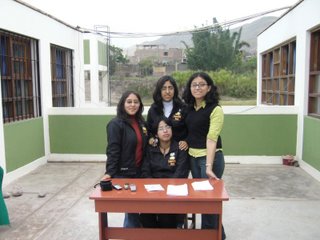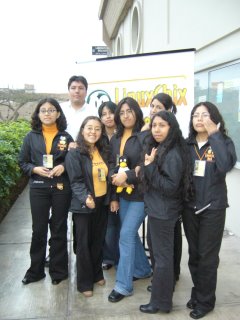::: January 1, 2007. 12:05 am:::
first day of the rest of my life :-)
Silvia Sugasti - [Adeene]
 Wiii tomorrow is holiday and I will meet with several little people do not see some time tomorrow if not I'll be in front of a PC ;-) And today I gave mine up about 6 pictures at Flickr are various logos I made for LCP and the end is that they know.
Wiii tomorrow is holiday and I will meet with several little people do not see some time tomorrow if not I'll be in front of a PC ;-) And today I gave mine up about 6 pictures at Flickr are various logos I made for LCP and the end is that they know. 
Technorati Tags: charisma, domination, Pinochet
Following the new excitement that causes the health of Augusto Pinochet, and awakened by an article written by Karina , I started thinking about weight can have this character today. A priori, I would say that nothing is more symbolic, since neither he has the power to change the lives of many of us (Hopefully you still have time to change out of the relatives of the disappeared), and has so many supporters that fly off the electoral calculation. So, I think the concept of domination carismátiaca Max Weber, which does not need to exert power, but simply "the probability of finding obedience within a specific group for specific mandates." (Weber, 1997:170) It is necessary that those who follow him do his own will, something that makes interesting obedience, in which the mandate directs the behavior more strongly than one's own opinion. Moreover, its legitimacy , that which underlies the maintenance of this dominance, involves the recognition of heroism and exemplary leader of , or at least its rare qualities.
Weber notes that the recognition dominated by validating the charisma of the leader, not what legitimizes it. In recognition qualities are corroborated by the faith and enthusiasm, and is part of the duties of the oppressed, who here play his vocation.
From this conceptualization, Pinochet is recognized by his followers every time he praises the current economic model, which implemented after the government took the country in order to avoid civil war at a time that ended ghost international Marxism and reorganized the country into the administrative, political, legislative and judicial. And all this was headed for 17 years, during which he was attacked, was recognized by most world leaders and prompted many democratic processes in times of crisis, leaving his government post after losing the last referendum. Of course, in his government also had negative aspects, but are attributed to conditions beyond it, as it can be extreme belligerence of dissident groups, who stood up and gave no option to manifest itself in all its power. Another hit.
Since 1998, Pinochet's image has changed. Once left the government remained strong while he was commander in chief, and later enjoyed the parliamentary immunity as a senator for life. But his arrest in London and his subsequent return to Chile began the debate about their health. When he stepped on the slab from the airport, rising from his wheelchair to greet his fans, forget the authoritarian leader that due to a violent attack could become a martyr, now it is a bearer of stigma, suffering and suffering he goes on (or stays afloat) judicial processes and diseases of all kinds. Beyond a reasonable doubt about the real state of his health, it is possible that these episodes are recognized dominated by such new shows about the unique qualities of Pinochet.
But is the charismatic domination Pinochet will end when I die? No, because charisma is routinized . When the rule goes beyond personal obedience and recognition, it is durable , legalized and / or becoming a traditional domination. [1] This happens, for example, the Pinochet Foundation, comprising an administrative cadre that wants to maintain a relationship around the figure of the leader and to society to establish an ideal position and material that, among other things, "enhance their prestige of command." (Weber, 1997:196)
On the other hand, I want to point out to me suggested the transverse axis of the recognition of Pinochet, who considers his political achievements, military and mystical. In politics, a government that laid the groundwork for what today is Chile, in the military, a commander who took part in the coup that ushered in the dictatorship, and who led the Army for almost 30 years, in the mystical The image of a saint that has been saved from an attack and many ailments "by a miracle." Is it configured so that a trinity is based on its passage through the three great powers we see in our societies? Notes
[1] The traditional rule is defined by Weber as one that is legitimized by precepts that have been inherited from very distant, and the belief in these precepts are rooted in his holiness and relations between sovereign and administrative staff goes through the faithfulness of the latter to the former. Reference
 And last Saturday four of chixs LinuxChix Peru were part of the speakers at "I GNU / Linux Bad Day 2006 (Mala obvious: P), organized by the LUG-Mala from here chixs thanked all for the nice stay and will host the Friends of the Poor and especially to John Mark who was kindly coordinate at all times with us.
And last Saturday four of chixs LinuxChix Peru were part of the speakers at "I GNU / Linux Bad Day 2006 (Mala obvious: P), organized by the LUG-Mala from here chixs thanked all for the nice stay and will host the Friends of the Poor and especially to John Mark who was kindly coordinate at all times with us.  Oo As many know, 'I love the music, may not be a self-confessed music lover (although I thought ... but I will improve this point to declare themselves as such , er); the point is that in the last 24 hours my brain via the transmission of my personal music mp3 player and my speakers my computer has been attacked by relentless R & B, so cute! so cool! and if this will put an eclectic mix of genres is a GOAL! or OMG!! large proportions: P.
Oo As many know, 'I love the music, may not be a self-confessed music lover (although I thought ... but I will improve this point to declare themselves as such , er); the point is that in the last 24 hours my brain via the transmission of my personal music mp3 player and my speakers my computer has been attacked by relentless R & B, so cute! so cool! and if this will put an eclectic mix of genres is a GOAL! or OMG!! large proportions: P.  Verse1
Verse1 

 WR Miguel and Jorge shooting in the third row (from top to bottom) from right to left: Angelin, Renato, two amis, Unimauro with
WR Miguel and Jorge shooting in the third row (from top to bottom) from right to left: Angelin, Renato, two amis, Unimauro with  From left to right: Ysbelt (Ysbelt), Paola (Chiodo), Pamela (Pamela), Angelin (Ace) Fabiola (Dolphin), Patricia (PathsLu), Sara (Sahm), Karina (Karys) and Silvi (Adeene)
From left to right: Ysbelt (Ysbelt), Paola (Chiodo), Pamela (Pamela), Angelin (Ace) Fabiola (Dolphin), Patricia (PathsLu), Sara (Sahm), Karina (Karys) and Silvi (Adeene)  Ace with thanks final and closing ceremony
Ace with thanks final and closing ceremony  harmonization is a round table were representatives from AYACSOFT, UPN, USMP-LUG , and Utpinux TUXPUC
harmonization is a round table were representatives from AYACSOFT, UPN, USMP-LUG , and Utpinux TUXPUC  Christian Palacios PC World we took some pictures of LCP and Some of our friends also took pics, that's why I did not know where to look lol was a funny moment: P
Christian Palacios PC World we took some pictures of LCP and Some of our friends also took pics, that's why I did not know where to look lol was a funny moment: P 
